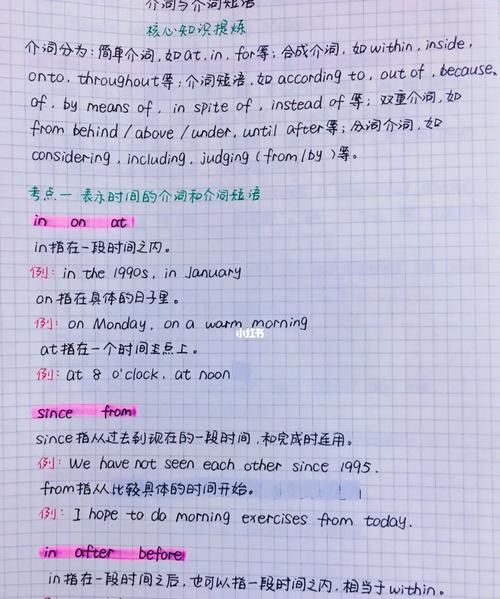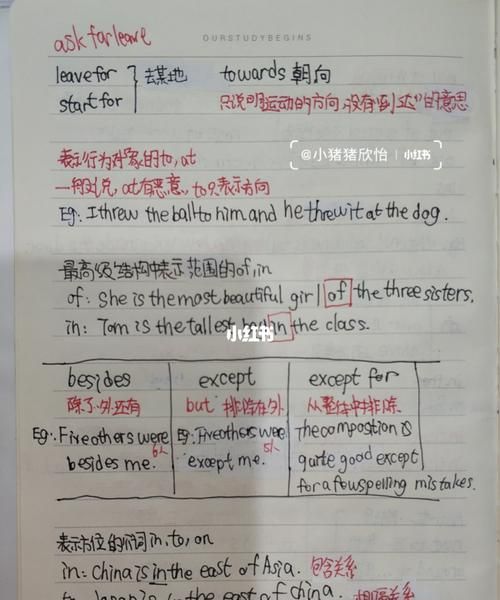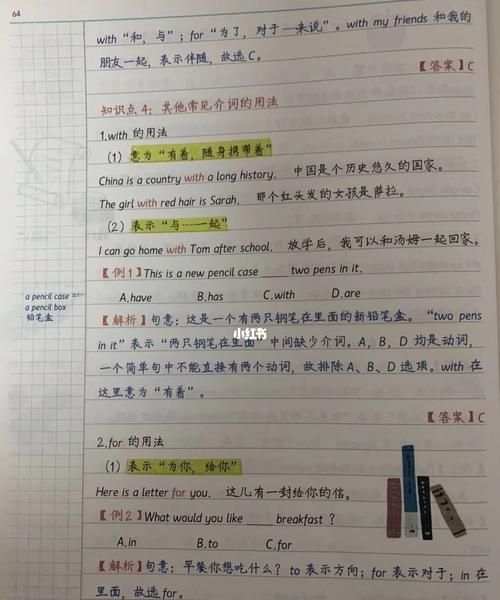本文目录
初中英语介词知识点思维导图
在英语中,介词虽然是一种小词,但在作用和运用上的复杂性却不可小看。首先,可以毫不夸张地说,离开了介词的中介或连接作用,就无法表达某些最基本的思想或概念。下面是我为您收集整理的初中英语介词知识点:常用介词要点,供大家参考!
初中英语介词知识点:常用介词要点
1、this / that / these / those / last / next / a / every / each等词构成的时间短语,前面不用任何介词。如:Every year travellers from abroad come to visit Pingyao.(每年都有国外的游客来游览平窑镇)/ He had a bad cold that week.(那个星期他患重感冒)
2、for有时用来引出动词不定式的逻辑主语,常翻译成“对于…而言”。如:It's too hard for me to finish the work in only one hour.(让我在区区一个小时内完成这项工作太难了)/ The house is big enough for 10 men to live in.(房子够大的可以容10个人住)
3、of有时用来表示后面的人物正好是前面的表语的逻辑主语。如:It's very nice/kind of you to do so.(你这么做真是太好了)
4、介词有时会与它的宾语分离,而且宾语前置。
①当宾语是疑问词时。Who are you talking about?(你们在谈论谁?)
②宾语在从句中当连接词时。He has a younger brother who he must take good care of.(他有 一个需要他照顾的小弟。) / Do you know who our teacher is talking with over there?(你知道我们的老师在那边和什么人谈话吗?)
动词不定式作定语且该动词为不及物动词,后面有介词。I finally found a chair to sit on.(我 最终找到了一张椅子坐。)
5、记住一些固定词组:arrive at/in(到达…),on foot(步行),not…at all(根本不),to the north of(在…以北),in the east of(在…的东部),in the night(在夜间),at night(在晚上),be afraid of(害怕…),be full of(充满/ 装满…),be filled with(充满/ 装满…),be good/bad for(对…有益/有害),be made of(由…做成),be made from(由…制造),play with(玩耍……),look out of(朝…外面看),at the end of(在…末梢/结束时),by the end of(不迟于…/到…末为止),with the help of或with one's help(在…的帮助下),look after(照料…),look for(寻找…),on a bike(=by bike)骑车, help sb. with(帮某人做…),get on (well) with(与某人相处[融洽]),等等。
初中英语介词知识点:介词用法辨析
1、时间或地点介词in、on、at的用法区别:表示时间时,in表示在一段时间里(在将来时句子中则表示在一段时间之后),on表示在具体的某一天或者某天的上下午等, at表示在某个时刻或者瞬间;表示地点时,in表示在某个范围之内,on表示在某个平面上或与一个面相接触,at则表示在某个具体的场所或地点。如:He was born on the morning of May 10th.(他出生于五月十日的早晨)/ I usually get up at 7:00 in the morning.(我通常在早上的七点钟起床) / His glasses are right on his nose.(他的眼镜就架在他的鼻子上)/ He is at the cinema at the moment.(此刻他正在电影院)
2、after与in表示时间的用法区别:“after+(具体时刻/从句)”表示“在…时刻之后”常用于一般时态;“in+(一段时间)”表示“在(多久)之后”,常用于将来时态。如:He said that he would be here after 6:00.(他说他六点钟之后会来这儿)/ My father is coming back from England in about a month.(我父亲大约一个月以后从英国回来)
3、since与for表示时间的用法区别:“since+(具体时刻/that-从句)”表示“自从…起一直到现在”,“for +(一段斶间)”表示“总共有…之久”,都常用于完成时态;如:Uncle Li has worked in this factory since 1970.(李叔叔自从1970年起就在这家工厂工作了)/ Uncle Li has worked in this factory for over 30 years. (李叔叔在这家工厂已经工作了30多年)
4、by、in与with表示方式的用法区别:都可以表示“工具、手段”,但是by主要表示“乘坐”某个交通工具或“以……方式”,在被动句中可以表示动作的执行者;in表示“使用”某种语言/文字,with表示“使用”某个具体的工具、手段。如:We see with our eyes and walk with our feet.(我们用眼睛看东西,用双脚走路)/ Please write that article(文章) in English.(请你用英语写那篇文章)/ Let's go to the zoo by taxi.(我们打的去动物园吧。)/ It was written by Lao She.(那是老舍写的)
5、about与on的用法区别:都可以表示“有关…”,但是about的意义比较广,而on主要表示“有关…(专题/课程)”。如:Tom is going to give a talk on the history of America.(汤姆要作一个美国历史的报告)/ They are very excited talking about the coming field trip.(他们兴致勃勃地谈论着即将来到的野外旅游)

介词的用法讲解视频
以下是我为大家整理的介词的用法 总结 讲解,希望能帮助大家更好地认识介词的用法,提高英语水平。
1.介词的分类
(1)简单介词如:at,by,for,from,in,of,on…
(2)复合介词如:into,onto,within,out of…
(3)双重介词 如:from under,since before,until after…
(4) 短语 介词如:in front of,because of,ahead of,according to…
另外,有的介词可以兼作副词(如:around,over等),有的介词可以兼作连接词(如:after,before等)。
2.介词短语在句中的作用
(1)作定语
例如:The man in black is Mr Zhang.穿黑衣服的人是张先生。
He is a man of wealth.他是个有钱人。
China is a country with a long history.中国是历史悠久的国家。
(2)作表语
例如:He was already in his forties.他已经四十多岁了。
You must remain in bed.你必须得卧床休息。
He was against slavery.他反对奴隶制。
(3)作状语
例如:At seventeen,he began to learn acting.
十七岁时,他开始学习表演。(时间状语)
We put the play on in a theatre.
我们在剧院上演这出戏。(地点状语)
We jumped with joy.
我们高兴得跳了起来。(原因状语)
He returned home for his dictionary.
他回家去取字典。(目的状语)
We went there by bike.
我们骑自行车去那儿的。(方式状语)
In spite of the heavy rain,they arrived.
尽管雨下得大,他们还是到了。(让步状语)、
(4)作补足语
例如:I found everthing in good condition.我发现一切状况良好。
Eevn his way of walking down the street and turning a corner could be recognaized as his own.
甚至他在街上走路时和在拐角处转弯时的那种姿态,都可以认为是他独有的动作。
The heavy rain kept us inside the house.(大雨使得我们待在了家里。)
3.关于介词值得注意的几个问题
(1)同一个介词的不同用法和意义,用at为例。
(A)表示地点,在……They are waiting for me at the gate.
(B)表示时间,在……时(刻) We usually get up at half past five every morning.
(C)表示状态,(正)在……中The Browns are at table.
(D)表示速度、价格,按……The truck ran at 40 miles an hour.
(E)表示动作对象、目标、向……Bob threw a stone at a dog.
(F)表示原因,由于…… He was surprised at his friend’s rudeness.
(G)表示能力,擅长于…… My sister is good at painting.
(2)同一介词跟不同动词构成不同意义的短语动词,以on为例。
(A)I hope to call on you in your office this afternoon.( 拜访 )
(B)We live on our salary.(依靠……生活)
(C)The price depends on quality.(依赖)
(D)He insisted on her staying in London.(坚持要)
(E)The doctor operated on her chest yesterday.(给……动手术)
(F)Put on your coat before you go out.(穿上)
(G)The village has taken on a new look.(呈现)
(3)同一动词跟不同介词构成不同意义的短语动词,以look为例。
(A)He looked about him but saw no one.(环顾)
(B)The boy is old enough to look after himself.(照料)
(C)Look at the photo,please.(看)
(D)What are you looking for?(寻找)
(E)I’ll look into the matter as soon as possible.(调查)
(F)I looked through today’s newspaper but I found nothing important in it.(浏览)
(G)You should learn how to look up word in a dictionary.(查阅)
(4)正确区分介词to和动词不定式符号to。
The murderer was sentenced to death.(介词)
The coffee in the cup is too hot to drink.(动词不定式符号)
(5)几种特殊的介词宾语。
(A)不定式作宾语:I desire nothing but to have a quiet room to study in.
(B)形容词作宾语:Although Spring has come,it is still quite cold instead of warm.
(C)副词作宾语:His father is fresh from abroad.
(D)介词短语作宾语:He has lived in Beijing since before liberation.
(E)由what,when,where,how等引导的从句作宾语(that从句例外):
(6)不要遗漏介词:
(A)不定式作定语修饰名词时,若该名词在逻辑上与其有动宾关系,不及物动词要有相应的介词。
Give me a piece of paper to write on.
(B)不定式在enough…to…句型中作结果状语时,若 句子 的主语在逻辑上与其有动宾关系,不及物动词要有相应的介词。
No bed is big enough for him to sleep on.
(C)在定语从句中,若关系代词是从句谓语动词的宾语,而这个动词又是不及物的,或者介词与关系代词一起表示时间、地点、工具时,都要有相应的介词。
I shall never forget the day on which I saw Premier Zhou for the first time.
I don’t know the person my father nodded to just now.
(D)在短语动词中,介词是固定的,不能随意变换,也不能省略。
4.容易混淆的几组介词举例
(A)after指以过去为起点的过去一段时间,跟过去时态连用,in指以现在为起点的将来一段时间,跟一般将来时连用。
He will come back in a week.一星期后他将回来。
He came back after three days.三天后他回来了。
(B)after指某个特定的未来时刻或日期之后,跟将来时连用。
I’ll be free after 5 o’clock.五点钟以后我有空。
He will come here after May 6th.五月六日后他要来这里。
(C)以将来(不是现在)某一时间为起点的若干时间之后,也可用after。
I’ll call on him next Monday and I’ll call again after two weeks.
(2)for,since,by,during
for表示某一动作延续到讲话时候为止,可以和完成时态连用;since其后跟表示时间的词语,多与完成时态连用,意思是从那个时候到讲话的时候;by表示时间上的界限,常与完成时和将来时连用,作“到……为止”解;during既可表示一段时间,又可表示这段时间内的某一点,意思是“在……期间”。
Where have you been since I last saw you?自从上次见面后,你去哪儿了?
They have stayed here for two months.他们在这儿待了两个月。
By the end of last term,we had learned 500 English words.到上学期末,我们学了五百个 英语单词 。
They swim every day during the holidays.假期他们每天 游泳 。
(3)by,with,in
by表示“以……方式、 方法 、手段”等,也可用来泛指某种交通工具;with表示“以……工具、手段”等,一般接具体的手段和工具;in表示“以……方式”或“用……语言(语调、笔墨、颜色)”等。
Did you come by train or by air?你是坐火车还是乘飞机来的。
I killed the spider with a newspaper.我用报纸打死了蜘蛛。
It’s written in ink.这是用墨水写的。
(4)in,on,to
in表示B在A的范围内;on表示B与A相毗邻;to表示B在A的范围之外。
China is in the east of Asia.中国在亚洲的东部。
I live in a town on the river.我住在临河的一个小镇上。
Japan lies to the east of China.日本在中国的东方。
(5)across,over,through
across表示从一边到另一边,“横过”的意思;over表示跨过一段距离,“越过”的意思;through表示通过一个空间,“穿过”的意思。
The dog swam across the river. 狗游过了河。
Light comes in through the window.光透过窗户射进来。
There is a short cut over the field.有一条小路穿过这片原野。
(6)besides,except,except for
besides含有“加”的关系,表示“除……之外,还(包括)……”,属于肯定性质;except含有“减”的关系,表示“所有都(如此)……除了……之外”,属于否定性质;except for表示在说明基本情况后,而在细节上加以修正,其后面的宾语与句中所涉及的内容并非同类。
Fifteen students went there besides Tom.
除了汤姆之外,还有15个学生去了那儿。(汤姆也去了,共16个。)
Fifteen students went there except Tom.
除了汤姆之外,有15个学生去了那儿。(共15人,汤姆没有去。)
Your composition is good except for some spelling mistakes.
除了一些拼写错误外,你的 作文 很好。
5.介词使用特例
在下列情况下,表示时间的状语作状语时前无介词:
(1)以next或last开头的短语
例如:We are meeting next Tuesday.我们下周二见面。
He stayed with us last week.上周他和我们在一起。
(2)以this或that开头的短语
例如:What are you doing this evening?你今天晚上要做什么?
He was coming to give a talk that very evening.在那天晚上他要来做 报告 。
(3)以tomorrow或yesterday开头的短语,包括the day after tomorrow和the day before yesterday
例如:I have to get up very early tomorrow morning.明天早上我得早起。
She had her operation the day before yesterday.她前天接受了手术。
(4)以one,any,each,every,some开头的短语
例如:Then one year,the rains failed to come.然后有一年没有下雨。
You can come any day you like.你愿意哪天来就哪天来。
Every morning,the newspaper chief editor holds a meeting with the journalists.
每天上午,报社主编都召集记者们开会。
Some day,we will meet again.总有一天,我们会见面。
Plants grow well all the year round.植物一年到头都长得很好。
(5)以most开头的短语
例如:Most of the time,we eat fish.大部分时间,我们吃的是鱼。
考题精讲
1.上海 2003
The confernce has been held to discuss the effects of tourism_________the wildlife in the area.
A.in B.on C.at D.with
解析:本题考查名词与介词的搭配使用问题,根据句中effects这个名词,选择on,表示“对……有影响”,故排除A、C、D项,选B项。
答案:B。
2.广东 2004
I feel that one of my main duties_________a teacher is to help the students to become better learners.
A.for B.by C.as D.with
解析:as此处理解成“作为”。
答案:C。
3.the foot of the hill there is a beautiful lake and_________the top of it there is a tower.
A.At;in B.At;on C.In;at D.On;at
答案:B
解析:在山脚下要用介词at,而在山顶既可用at,也可用on。
4.He will spend his holidays_________ National Day.
A.at B.for C.after D.it
答案:C。
解析:after与“在某一特定时间”的词语连用时,句子谓语动词既可用过去时,也可用将来时。此句可以把National Day当作一个特定的时间。意思是“他要在 国庆节 后度假。”
名题精练
1.—How long has this bookshop been in business?
—_________1982.
A.After B.In C.From D.Since
2.We offered him our congratulations_________ his passing the college entrance exams.
A.at B.on C.for D.of
3.American women usually identify their best friend as someone_________they can talk frequently.(2004·上海)
A.who B.as
C.aboutwhich D.whith whom
4.Everyone enjoyed the party_________May Day,that is to say,_________this Saturday.
A.on;on B.at;on
C.at;in D.on;/
5.What kind of animal can live both_________land and_________water?
A.on;on B.in;on C.on;in D.in;in
6.The coffee shop is_________she street.
A.on B.across C.in D.to
7.Let’s walk over_________ the sun on the other side of the street.
A.to B.below C.under D.by
8.In this matter,I’m sorry that I have to sideyou.
A.at B.to C.against D.with
9.We normally use the front entrance_________ the building but there is another entrance_________the back.
A.to;to B.at;at
C.to;at D.of;in
10.The police have said that there is no connection_________the murders.
A.in B.for C.on D.between
11.To my horrow,I saw,_________my father’s shoulder,a gorilla.
A.on B.above C.over D.from
12.My first customer was a girl_________a red dress.
A.of B. with C.on D.in
13.How long have you been up?
five o’lock.
A.After B.In C.on D.in
14.What language did you talk with the foreigner_________ ?
A. / B. in C. with D. by
15. He will always be remembered_________ one of the greatest teachers of the Chinese people.
A. by B. as C. like D. for
16. —Where did you go_________ your holiday?
—I went to Hainan province.
A. to B. for C. in D. on
17. I stepped_________ the bus and_________ the snowstorm,but I was often_________ the highway.
A. from;into;on B. out of;into;off
C. out of;in;in D. off;through;from
18. He showed me a photo of the hotel he stayed_________ .
A. where B. there
C. in it D. in
19. The camel was blind_________the right eye and only ate the grass_________ the left side.
A. on;in B. in;on
C. in;at D. at;on
20. Ideas_________what are good manners are not always the same_________ different countries.
A. of;in B. about;from
C. by; among D. on;
--------------------------------------------------------------------------------------
介词的用法讲解相关 文章 推荐:
1. 介词的用法讲解
2. 地点介词用法详解
3. 介词的用法记忆口诀
4. 英语介词by用法归纳
5. 介词With的用法小结
6. 英语介词for的用法归纳总结
7. 介词“与”在文言中的用法详解
8. graduate的用法说明
9. 常用介词的分类及用法

初中英语时间介词的用法归纳
介词是一种用来表示词与词, 或者词与句之间的关系的词,在句中不能单独作句成分。初中英语介词的用法很多,为此,以下是我分享给大家的初中英语介词的用法归纳,希望可以帮到你!
初中英语介词的用法归纳
表示方位的介词:in,to, on
1. in 表示在某地范围之内。
如:
Shanghai is/lies in the east of China.
上海在中国的东部。
2. to 表示在某地范围之外。
如:
Japan is/lies to the east of China.
日本位于中国的东面。
3. on 表示与某地相邻或接壤。
如:
Mongolia is/lies on the north of China.
蒙古国位于中国北边。
2表示计量的介词:at, for, by
1. at表示“以……速度”“以……价格”。
如:
It flies at about 900 kilometers a hour.
它以每小时900公里的速度飞行。
I sold my car at a high price.
我以高价出售了我的汽车。
2. for表示“用……交换,以……为代价”。
如:
He sold his car for 500 dollars.
他以五百元把车卖了。
注意:at表示单价(price) ,for表示总钱数。
3. by表示“以……计”,后跟度量单位。
如:
They paid him by the month.
他们按月给他计酬。
Here eggs are sold by weight.
在这里鸡蛋是按重量卖的。
3表示材料的介词:of, from, in
1. of成品仍可看出原料。
如:
This box is made of paper.
这个盒子是纸做的。
2. from成品已看不出原料。
如:
Wine is made from grapes.
葡萄酒是葡萄酿成的。
3. in表示用某种材料或语言。
如:
Please fill in the form in pencil first.
请先用铅笔填写这个表格。
They talk in English.
他们用英语交谈。
注意:in指用材料,不用冠词;而with指用工具,要用冠词。
请比较: draw in pencil 与draw with a pencil.
4表示工具或手段的介词:by, with, on
1. by用某种方式,多用于交通。
如:
by bus 乘公共汽车
by e-mail. 通过电子邮件
注意:
表示搭乘交通工具时,用by时不用冠词,用in时要用冠词。
请比较:
I went there by bus/in a bus.
我是坐公共汽车去的那儿。
2. with表示“用某种工具”。
如:
He broke the window with a stone.
他用石头把玻璃砸坏了。
注意:
with表示用某种工具时,必须用冠词或物主代词。
3. on表示“以……方式”,多用于固定词组。
如:
They talked on the telephone.
他们通过电话进行交谈。
She learns English on the radio/on TV.
她通过收音机/电视学英语。
5表示关于的介词:of , about,on
1. of仅是提到或谈到过某人或某事。
如:
He spoke of the film the other day.
他前几天提到了这部影片。
He thought about this matter yesterday.
他昨天考虑了这件事。
2. about指“关于”某人或某事物的较详细的情况。
如:
Can you tell me something about yourself?
你能告诉我一些关于你自己的事情吗?
3. on指“关于”学术性的或严肃的事。
如:
It’s a textbook on the history of china.
它是一本有关中国历史的教科书。
6表原因或理由的介词:for, at,from,of, with, by,because of
1. for表示原因,常与sorry, famous, punish, praise, thank, blame等词连用。
如:
I am sorry for what I said to you.
我后悔不该对你讲那些话。
2. at指情感变化的原因,意为“因听到或看到而……”。
如:
He was surprised at the news.
听到这消息他大吃一惊。
3. from指“外在的原因”,如受伤、车祸等。
如:
He died from the wound.
他因受伤而致死。
4. of指“内在的原因”,如病、饿等。
如:
The old man died of hunger.
老人死于饥饿。
5. with指生理上或情感上的由外界到内心的原因。
如:
Hearing the news, he jumped with joy.
他们听到这个消息,欣喜若狂。
He was shaking with anger.
他气得浑身发抖。
6. by表示外部的,尤其是暴力的或无意中造成某种结果的原因。
如:
Her body was bent by age.
他因年老背弯了。
She took your umbrella by mistake.
我因弄错拿了你的雨伞。
7. because of 表示引起结果的直接原因。
如:
He retired last month because of illness/because he ill.
他上个月因病退休了!
8. owing to多表示引起某不良后果的原因。
如:
Owing to the rain they could not come.
由于下雨他们没来。
9. thanks to表示引起某种幸运结果的原因,常译为“幸亏……,多亏……”。
如:
Thanks to John, we won the game.
多亏约翰,我们才赢了这场比赛。
10. out of表示动机的起因,常译为“出于……”。
如:
He asked the question out of curiosity.
他出于好奇才问了那个问题。
11. through多表示因局部而影响全局的原因。
如:
The war was lost through bad organization.
战争因组织不周而失败了。
初中英语必考介词词组
1. 在…的前面
in front of (范围外的前面)
in the front of (在范围内的前面)
There is a river ________ my house.
我家前面有一条河。
There is a blackboard ___ our classroom .
教室前面有一块黑板。
2.在树上
on the tree 强调树上长出的东西 (苹果,橘子)
in the tree 外来物体(人,鸟,风筝)
There are some birds _____ the tree.
树上有一些鸟。
There are some apples _______ the tree.
树上有一些苹果。
3.时间表达:
in + 某月 / 某季节 / 某年 (时间长)
on + 某天 (中)
at + 具体几点几分 (短)
固定短语: in the morning / afternoon / evening
at night, at noon
练习: __January , __ summer, ___ 2014
______ Sunday, ___ March 4th, ___ March
___ _ Sunday morning,_____ the morning
_______ the morning of June 5th
_______ 6:30, ____ night, __ noon
4.在墙上
on the wall
在墙壁表面 (相片photo,图画picture)
in the wall
在墙壁的里面 (门door, 窗户window )
(1)There is a photo of my family
_______ the wall.
(2)There are two doors ______ the wall.
5. 在…之上
on: 在…的表面之上(物体之间有接触)
over: 在…的正上方(物体没有接触)
above 高于......;
在......之上”,多指在相对较高位置
(1)There is a book ______ the desk.
书桌上有一本书。
(2)There is a bridge ______ the river.
河上有一座桥。
(3)The plane flies ______the clouds(云).
飞机在云层上飞行。
6.地点表达法
(1)in 后接较大的地方
如: in Beijing, in China.
(2)at 后接较小的地方
如: at the railway station, at the bus stop
(3)on 常用于一些习惯用语
on a farm 在农场 on the earth 在地球上
on earth 究竟
at home, at school, at the back of ,
at the back of the classroom
At the end of the street,
at the second crossing
过关练习
1.There is a bank ____ the school and
there is a big desk _____the classroom.
A. in front of , in the front of
B. in the front of, in front of
2. There are some pictures _____ the wall and ______ two windows _____ the wall.
A. in, on B. on, in
3. I can see some birds ______ the tree. Look ,there are some apples ____ the apple tree.
A. on, in B. in , on
4. ---When were you born?
--- I was born _____ April.
A. in B. on C. At
5. Tom was born ______ April 5th.
A. in B. on C. At
6. I usually get up _____10 :00 ____ Sunday.
A. at, in B. at, on C. in, on
7. I arrived (到达) ___ Beijing
yesterday(昨天).
A. on B. in C. at
8.she arrived ____the railway station
just now(刚才).
A. on B. in C. at
9.There is a computer ____ the desk.
A. above B. on C. over
10.There is a bridge _____ the river(河).
A. above B. on C. over
本节回顾
1. 在…的前面
in front of (范围外的前面)
in the front of (在范围内的前面)
2.在树上
on the tree 强调树上长出的东西 (苹果,橘子)
in the tree 外来物体(人,鸟,风筝)
3.时间表达:
in + 某月 / 某季节 / 某年 (时间长)
on + 某天 (中)
at + 具体几点几分 (短)
4.在墙上
on the wall
在墙壁表面 (相片photo,图画picture)
in the wall
在墙壁的里面 (门door, 窗户window )
5. 在…之上
on: 在…的表面之上(物体之间有接触)
over: 在…的正上方(物体没有接触)
above 高于......;在......之上”,
多指在相对较高位置
6.地点表达法
(1)In 后接较大的地方
如: in Beijing, in China.
(2)at 后接较小的地方
如: at the railway station, at the bus stop
(3)on 常用于一些习惯用语
最常见的介词错误用法
1) arrive at 还是 arrive in
*When we arrived to Claudio’s house…
at通常用在具体的地点前:school学校、restaurant餐厅、airport机场、aunt’s house阿姨的家;而in通常用在城市或国家前面。
✓ When we arrived at Claudio’s house…
我们到达克劳迪奥的家……
✓ The train arrived at Shibuya station thirty seconds late.
火车延迟30秒到达涩谷车站。
✓ On Friday, the president arrived in Poland.
总统于周五到达波兰。
✓ The K-pop band arrived in Phnom Penh last week.
韩国流行乐队上周到达金边。
2) at night
*We often go out in the night.
in可以用在in the morning, in the afternoon, 和in the evening里,但是night前面需要用at。
✓ We often go out at night.
我们经常在夜晚出门。
✓ Krakow is beautiful at night.
夜晚的克拉科夫很美。
3) look for 还是 wait for
*I was looking my glasses.
*Giulia was waiting me at the bus stop.
如果你想表达寻找,那么用look for或者search for;如果你想表达等待,那么用wait for。
✓ I was looking for my glasses.
我在寻找我的眼镜。
✓ Tomis looking for a new job.
汤姆正在寻找一份新工作。
✓Giulia was waiting for me at the bus stop.
茱莉亚正在车站等着我。
✓Lucy is waiting for her sister to finish class.
露西正在等她的妹妹放学。
4) for [period of time]
*I’ve been working here since five years
for用在一段时间前面,比如:a few minutes/three months/twenty years。
since和具体的时间点连用,比如:this morning/September/the day we met。
✓I’ve been working here for five years.
我已经在这里工作五年了。
✓She hasn’t drunk coffee for years.
她好多年不喝咖啡了。
✓She’s been living in Yokohama since February.
她从二月起一直住在横滨。
✓I haven’t seen her since yesterday morning.
昨天早上之后,我就没再见到她。
5) in [months and years]
*It’s my birthday on July!
in总是和年份或月份连用。
✓It’s my birthday in July!
我的生日在7月。
✓Ola was born in 2004.
欧拉出生在2004年。
6) live/work/study in [cities and countries]
*I live at Tokyo.
在某个城市或国家居住、工作或学习用in,但住在某个具体的地址则用at,比如在一个特定的机构工作,或者是在某所大学学习。
✓I live in Tokyo.
我住在东京。
✓Roberta works in Sassari.
罗伯塔在萨萨里工作。
✓Hector studies in Canada.
赫克托尔在加拿大学习。
✓Ania lives at No.34, Green Street.
艾尼雅住在格林大街34号。
✓Ryosuke works for Toyota.
凉介在丰田工作。
✓Dara studies at Phnom Penh International University.
达拉在金边国际大学读书。
7) on [days and dates]
*It’s my birthday in Saturday!
on和具体的星期几或日期连用:
✓It’s my birthday on Saturday!
我的生日在周六!
✓It’s my birthday on May 1st. (But remember: It’s my birthday in May.)我的生日在五月一号。(但是要记住:我的生日在五月用 in。)
8) it depends on
*It depends of what you want: Italian food or Chinese food.
depend后面如果要加某人或某物,一定要和on连用,不然只能说it depends。
✓It depends on what you want: Italian food or Chinese food.
这取决于你想吃什么:意大利菜还是中国菜。
✓We’ll go to either Disney World or the beach, depending on the weather.
我们要去迪士尼乐园或海滩,这要看天气。
✓What do you usually have for breakfast – tea or coffee? – It depends!
你早餐通常喝什么——茶还是咖啡?—看情况。
9) welcome to
*Welcome in Peru!
欢迎到某地用welcome to+地点,比如:a house/school/organization/city/country。
✓Welcome to Peru!
欢迎来秘鲁!
✓Welcome to Cagliari.
欢迎来卡利亚里。
✓Welcome to Meiji University.
欢迎来明治大学。
✓Welcome to the Plaza Hotel. We hope you enjoy your stay.
欢迎来广场饭店,我们希望你在此过得愉快。
10) married to
*He’s married with Kim.
与某人结婚要用married to或者get married to,也可以说marry sb.。
✓He’s married to Kim.
他和金结婚了。
✓John’s getting married to Sara next summer.
约翰明年夏天要和萨拉结婚。
✓Kate is marrying my old school friend.
凯特要和我的一个老校友结婚了。
猜你喜欢:
1. 初中英语八种时态归纳复习要点
2. 英语比较级和最高级的用法归纳
3. 初中英语常用介词短语
4. 初中英语备考知识点:时间介词
5. 初一英语介词的知识点归纳

中考常考介词短语或词组搭配
我们在学习英语的过程中,总是需要记忆和背诵许多的单词和词组。因为只有掌握了这些词组,我们才能够在日常阅读中区分这些词组,我们才能够在考试中获得优异的成绩。当然,对于大部分学生,记忆和区分这些词组是极其困难的。所以,我们需要掌握一些技巧和方法来帮助我们有效的区分这些单词和词组。

一、理解不同介词的意思
当我们在学习这些介词词组的时候,我们不应该只是单纯地记忆这些短语的整体含义,我们还应该将这些介词的具体意思进行推敲。因介词短语词组之间的区别,就是因为他们所搭配的介词不同才使得这些短语的意思发生了变化。比如,介词up意为“向上”,look up就是“向上看”的意思,相反的look down就是“向下看”的意思。所以,我们需要先去理解不同介词的意思,然后根据他们的搭配进行联想就能够很快记住这些短语词组的意思了。

二、根据具体语境理解介词短语词组的意思
我们应该明白,所有的词汇都是需要运用到具体的语境当中的。我们只有根据具体的语境理解这些这些词汇和词组的意思,才能够将这些东西牢牢记住。所以,我们在日常的学习当中,要结合具体语境来记忆这些短语词组。

三、及时做笔记积累相关词汇
人们都说,好记忆不如烂笔头,眼过千遍不如手过一遍。当然,英语知识的学习也应当如此。在日常的学习过程中,我们应当重视知识的积累。当我们遇到类似的英语介词短语词组时,我们应该及时地将这些相关词汇记录下来。而且,我们还需要不断地巩固记忆才能够真正掌握这些相关知识。
以上就是关于介词整理笔记 ,初中英语介词知识点思维导图的全部内容,以及介词整理笔记 的相关内容,希望能够帮到您。
